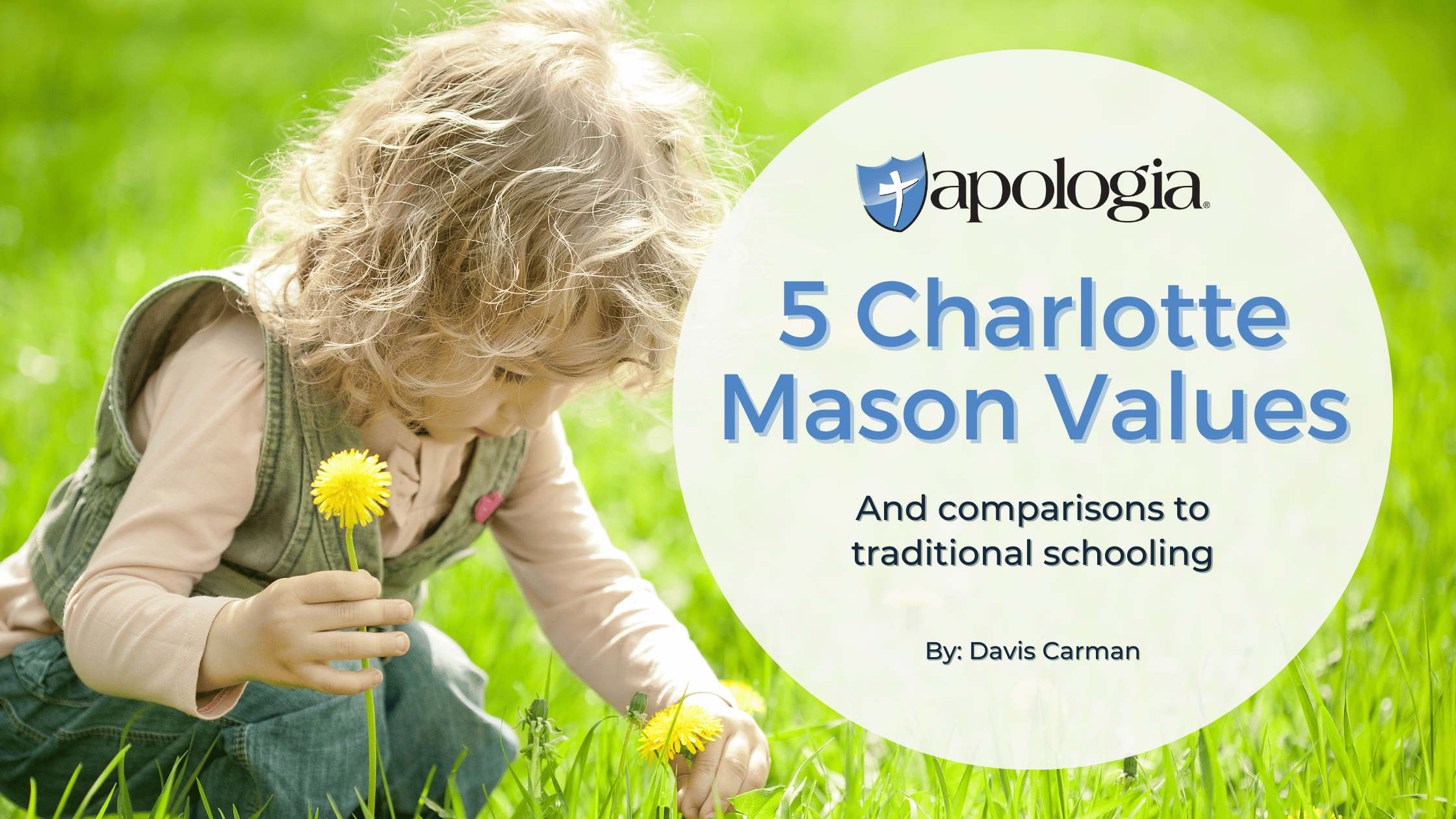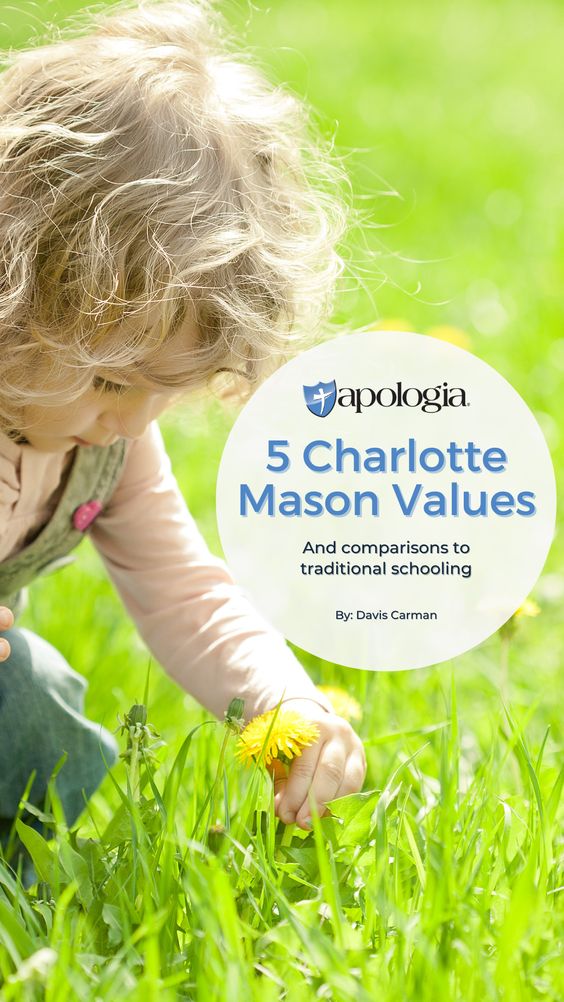
5 Charlotte Mason Values: And Comparisons to Traditional Schooling
If you’ve been running in homeschool circles or researching home education online, you’ve probably heard of Charlotte Mason. Apologia’s curriculum is based on the Charlotte Mason educational philosophy. But what are the Charlotte Mason values, and how can you incorporate it into your homeschool?
“Education is a life, an atmosphere, a discipline.” – Charlotte Mason, 1842-1923
Families who home-educate their children often talk about how homeschooling is a lifestyle. I think the British educator, Charlotte Mason, would agree. Let’s take a look at five of the key values of the Charlotte Mason approach and compare them to traditional, classical education.
Charlotte Mason Value #1—A Child is a Full Person
Your children are people too. They are made in the image of God, eager to learn and discover the world around them, yet cursed with a sinful nature. Therefore, they need guidance combined with restraint in the learning process.
Value #2—Education is the “Science of Relations”
Don’t think of your children as buckets to fill with information. Educate the whole person, not just the mind. Exploring creation and discovering the beauty of the natural world will connect your children to the Creator and develop in them a healthy sense of awe and wonder. The most important relationship to encourage is the one your children have with God Almighty, maker of heaven and earth and all that is—visible and invisible.
Value #3—Children Deserve a Rich Curriculum
When you consider that “Education is a life,” as Charlotte Mason posited, then the food that sustains that mental life is ideas. Reading will introduce your students to ideas. Read together. Read aloud. Read living books and classic literature. In addition to reading good books, let your children interact with nature. In other words, send them outside where the heavens declare the glory of God, and have them record what they observe in a nature journal. Include in that journal the leaves and flowers that they gather. Provide a box for rocks, pine cones, cocoons, and other larger items they collect.
Charlotte Mason Value #4—Learning Should Be Teacher-Guided and Self-Directed
Devote your mornings to studying subjects with minimal time allotted for passive lecturing. In the afternoons, turn everyone’s attention to nature, art, music, reading and play. Incorporate a good dose of structured free time into your daily routine. As a parent, your job is to fan the flame of your child’s natural curiosity. In other words, cultivate a love of learning. For the most part, you can stand back and watch it happen.
Value #5—Atmosphere Educates
Finally, be fully aware that the context of family life matters. Your home environment should support order and good character development. Keep your rooms neat, clean, and clutter-free. Create an atmosphere of family peace and love. Display pictures of loved ones on the walls. Provide a spot for the family pet to be included; it’s remarkable how much support pets can provide and what a calming effect they can have. Also, take advantage of mealtimes by sitting down together with your children and engaging in hearty conversations at the dinner table.
Three Differences Compared to Traditional, Classical Education
In some circles, the Charlotte Mason teaching philosophy is closely aligned with traditional, classical education. Both include many good elements; however, the two are not the same. I want you to be aware of three key differences between them.
First, traditional, classical education views children as passive vessels to be filled with information. Charlotte Mason sees children as active, eager learners. Don’t fill a bucket. Instead, fan the flame.
Next, traditional, classical education incorporates long lectures, memorization and drills. Charlotte Mason encourages devoting as little time as possible to lectures. Instead of memorizing facts, learn ideas by way of reading living books and processing the new information gathered in notebooking journals. This is especially important for your elementary-aged students. Avoid the disaster of “drill and kill” with worksheets, quizzes, and tests.
Here’s a third difference- traditional, classical education emphasizes grammar, logic and rhetoric. By contrast, Charlotte Mason emphasizes formal, in-school education (reading, ’riting, ’rithematic), formal, out-of-school education (music, art, athletics), and informal education (play, dinner table conversations, outdoor exploration, and structured free time).
If you are like most homeschooling parents, the more you learn about the Charlotte Mason approach to education, the more excited you become about incorporating the ideas into your children’s lives. In other words, you will work to make it a literal lifestyle. The idea of instilling a love of reading and cultivating a lifetime love of learning can and should be inspiring. What a wonderful gift you can give to your children!
I like to say that every child is a homeschooled child, but not every parent is a homeschooling parent. However, there is good news: you can be taught. My hope and prayer is that this article provides a golden nugget or two that you can take and turn into something beautiful to bless yourself, your children, your homeschool and your family.
Notebooking Journals—A Charlotte Mason Resource
Apologia’s Notebooking Journals are the perfect complement to the Young Explorer series. Our Charlotte Mason-based, full-color notebook provides everything your student needs to complete each course, including a place for your students to illustrate and document fascinating facts and information learned during each lesson. They can record experiments, activities and projects, complete vocabulary crossword puzzles, create beautiful mini-books and more! A detailed daily schedule is included in each notebook to make planning a breeze.
Each Notebooking Journal has been designed to facilitate teacher-guided and self-directed learning, with space for unique, personal writings and artistic expressions that engage both sides of the brain. The notebooks offer great flexibility by allowing for multilevel learning: a twelve-year-old student may write an essay and make an elaborate illustration, while a six-year-old may write one sentence with a stick-figure drawing.
Review questions may be answered orally or in writing. Scripture copywork pages allow for print and cursive, which is a valuable method for not only practicing handwriting but also memorizing Scripture and teaching spelling, grammar and writing.
Apologia’s Notebooking Journals serve as a keepsake and a record of your student’s scientific and other academic endeavors throughout the year. Mom, Dad, get a textbook for yourself to read to your children. Then be sure to get each one of your students his or her own copy of the corresponding Notebooking Journal.
Walking by faith,
Davis Carman



